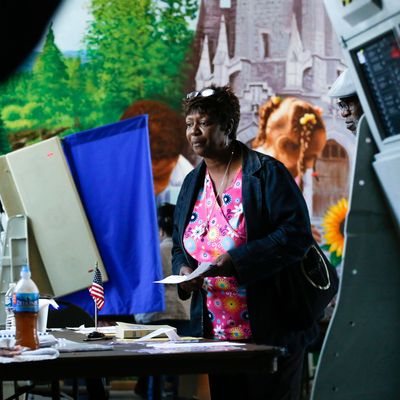
In 2013, when a 5-4 majority of the U.S. Supreme Court invalidated Section 4 of the Voting Rights Act of 1965 in the Shelby County v. Holder decision, it was widely and immediately understood that the elimination of the Section 4 formula for identifying jurisdictions guilty of past discriminatory actions would effectively kill the Section 5 requirement that such jurisdictions obtain a “preclearance” from the U.S. Justice Department before initiating changes in voting laws or procedures. But as Julie Fernandes recently pointed out at Democracy, the decision also eliminated the basis for a separate Justice Department program providing for federal election observers in Section 4 jurisdictions. So there will not be any this November, for the first time in 50 years.
The main function of these federal observers was to deter by their presence and, if necessary, report on efforts to intimidate or otherwise discourage voting by minority citizens. As Fernandes notes, it was once a pretty big deal locally, if not much reported on nationally:
In the 2004 general election, the Department of Justice sent 1,463 federal observers to monitor 55 elections in 30 jurisdictions in 14 states. This year, that number will be close to zero despite the fact that 17 states have restrictive voting laws in effect for the first time in an election cycle where the political rhetoric has been extremely racially charged at the national level.
The shadow of the Shelby County decision is getting longer and longer, it seems. Republican-controlled southern states could barely wait until the ink on the majority opinion was dry before instituting voting changes that would have once been delayed and perhaps undone by the Justice Department in the past. And now Election Day (and the early voting that happens before Election Day), long the occasion for all sorts of racist high jinks such as last-minute changes in polling places in minority neighborhoods or anonymous threats that minority voters will be scrutinized by law-enforcement officials, will happen largely out of sight except for places where civil-rights groups or civic organizations manage to replace the lost federal observers.
Congress could have fixed this problem along with others raised by Shelby County (and indeed, as the Court invited it to do), by reenacting a version of Section 4 that would survive judicial scrutiny. And there was once considerable bipartisan talk about doing just that. But lo and behold, this has not been a priority for Congress’s current Republican management, so nothing has been done. And thus another layer of protection for people who struggled so long to secure the right to vote has been pulled away, inviting a return to ancient discriminatory practices. Yes, Supreme Court decisions matter.






























